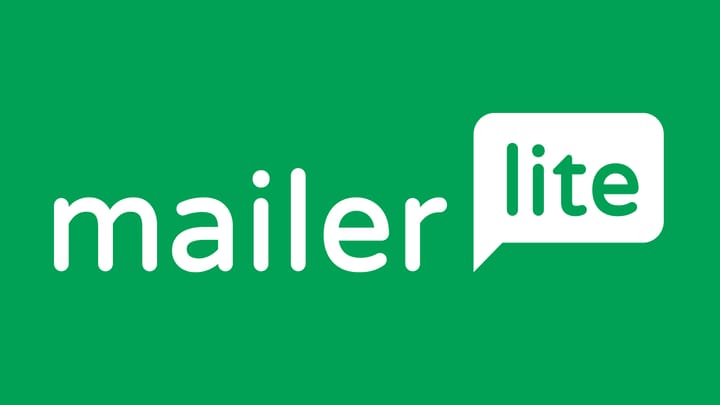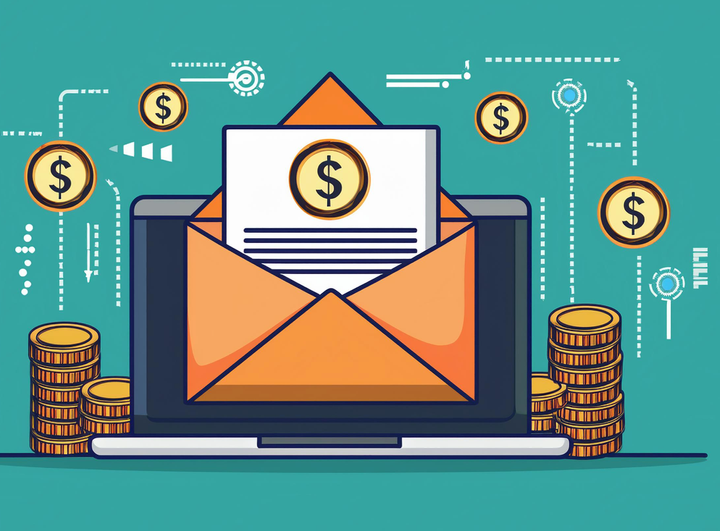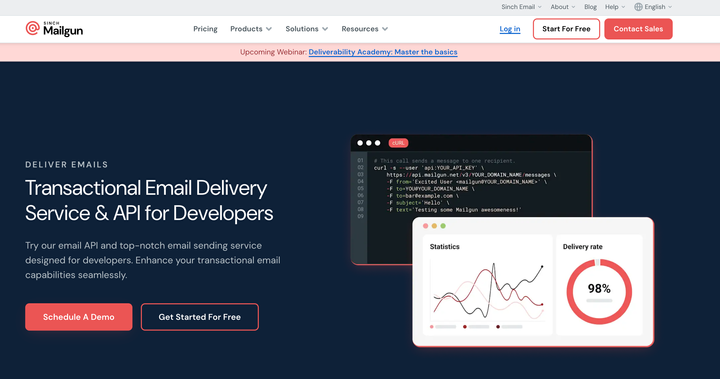Top 10 AWeber Alternatives That Deliver Better Results in 2025
As your business evolves, you might find yourself bumping against AWeber's limitations if you're getting the best value for your investment.
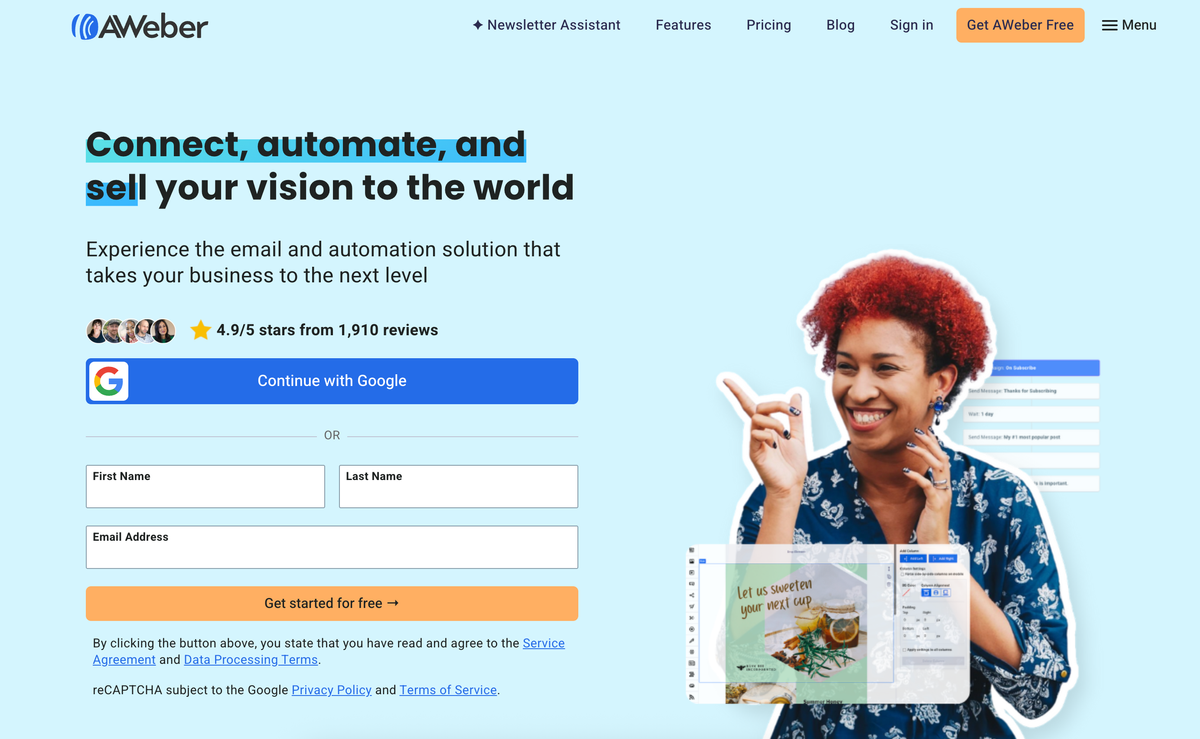
AWeber has long been a stalwart in the email marketing landscape, helping countless businesses build relationships with their customers through reliable delivery and straightforward campaign management. It's a platform that many marketers have relied on for years.
However, as your business evolves, you might find yourself bumping against AWeber's limitations or questioning if you're getting the best value for your investment. Common pain points we hear from AWeber users include:
- Pricing structures that become less competitive as your subscriber base grows
- Feature limitations compared to newer, more innovative platforms
- Scaling challenges when your marketing needs become more sophisticated
- Interface that sometimes feels dated compared to modern alternatives
Whether you're seeking more advanced automation capabilities, better pricing, or specialized features tailored to your industry, we've compiled this comprehensive guide to the top 10 AWeber alternatives worth considering in 2025.
1. Maileroo – Best for Budget-Conscious Businesses
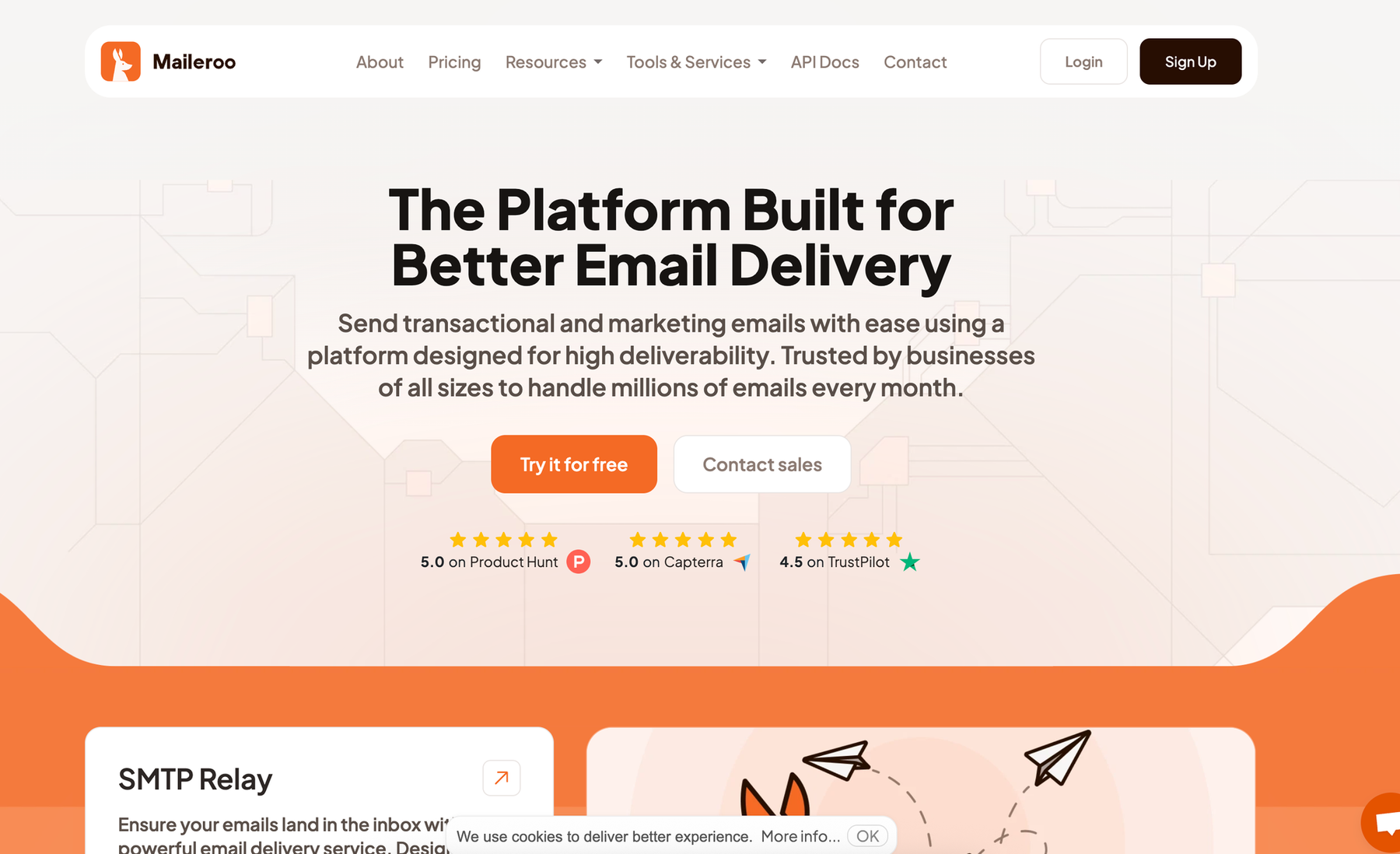
Overview: Maileroo stands out as a cost-effective email marketing and transactional email platform that doesn't sacrifice quality for affordability. What truly sets it apart is the exceptional customer support—you'll actually speak with real humans who understand email marketing challenges.
Key Features:
- Intuitive drag-and-drop email editor that simplifies campaign creation
- Robust automation workflows for targeted customer journeys
- Real-time analytics that provide actionable insights
- Seamless SMTP and API integration for developers
- Combined marketing and transactional capabilities in one platform
Pricing: A free plan is available for up to 5,000 emails, while paid plans start at just $10 per month for 25,000 emails and include no hidden fees.
Best For: Businesses seeking affordable, reliable email delivery with personalized support that's actually responsive when you need help.
Pros:
- Exceptionally budget-friendly pricing model
- Outstanding deliverability rates
- Responsive and knowledgeable customer support
- Simplified DNS setup process
Cons:
- Newer platform compared to some established competitors
- Some advanced features still in development
2. MailerLite—Best for User-Friendly Experience
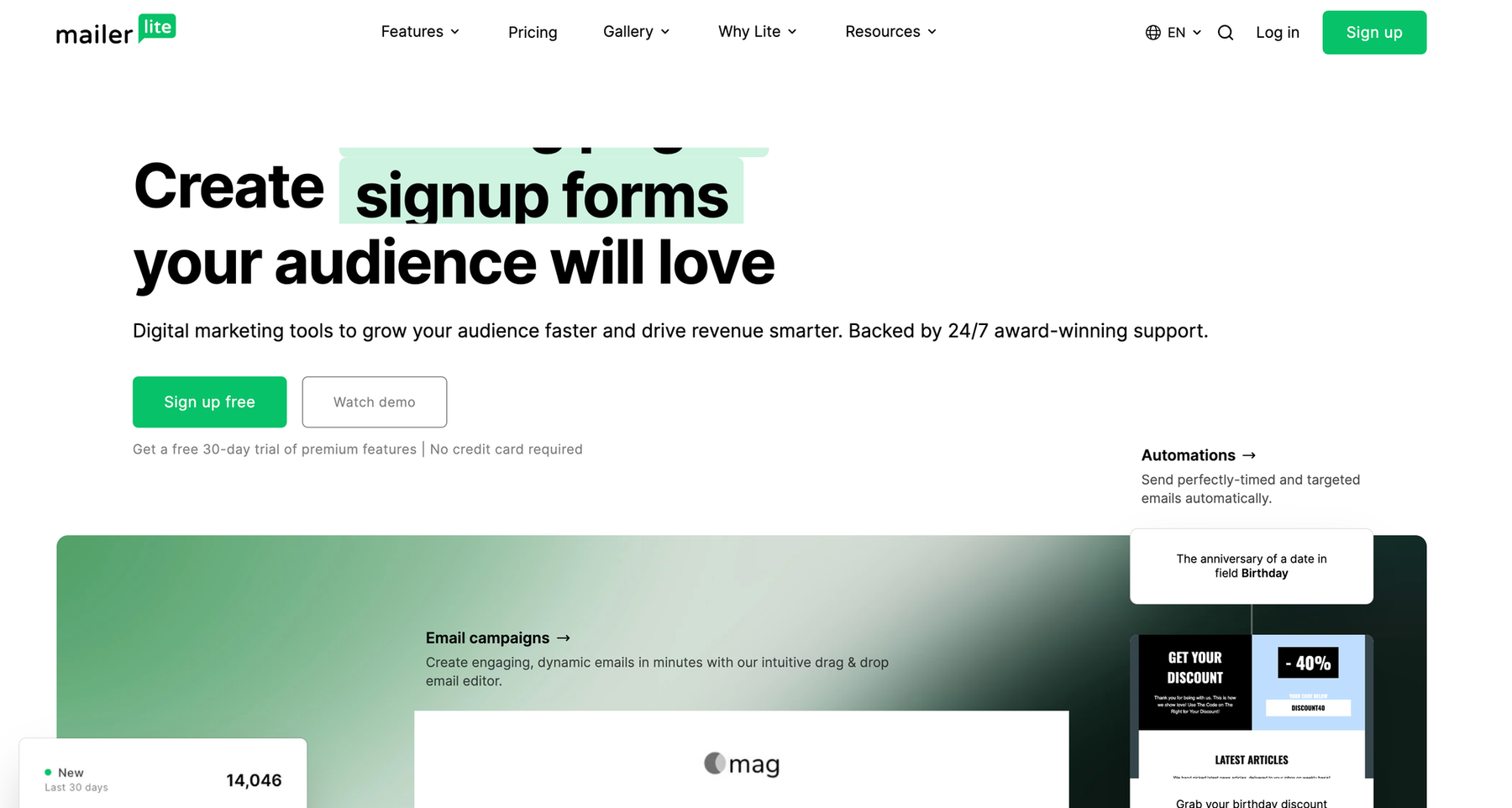
Overview: MailerLite has built its reputation on simplicity without sacrificing functionality, making it perfect for marketers who want powerful features without the complexity.
Key Features:
- Clean, intuitive drag-and-drop editor
- Sophisticated automation workflows
- Integrated landing page builder
- E-commerce tools for online retailers
- Rich free plan for smaller businesses
Pricing: Free for up to 1,000 subscribers; paid plans starting around $10/month.
Best For: Small businesses and content creators looking for simplicity while still accessing robust marketing tools.
Pros:
- Exceptionally intuitive user interface
- Feature-rich free plan that delivers real value
- Affordable pricing as you scale
- Excellent customer support
Cons:
- More limited advanced segmentation options
- Fewer third-party integrations than some competitors
3. Mailchimp—Best for All-in-One Marketing
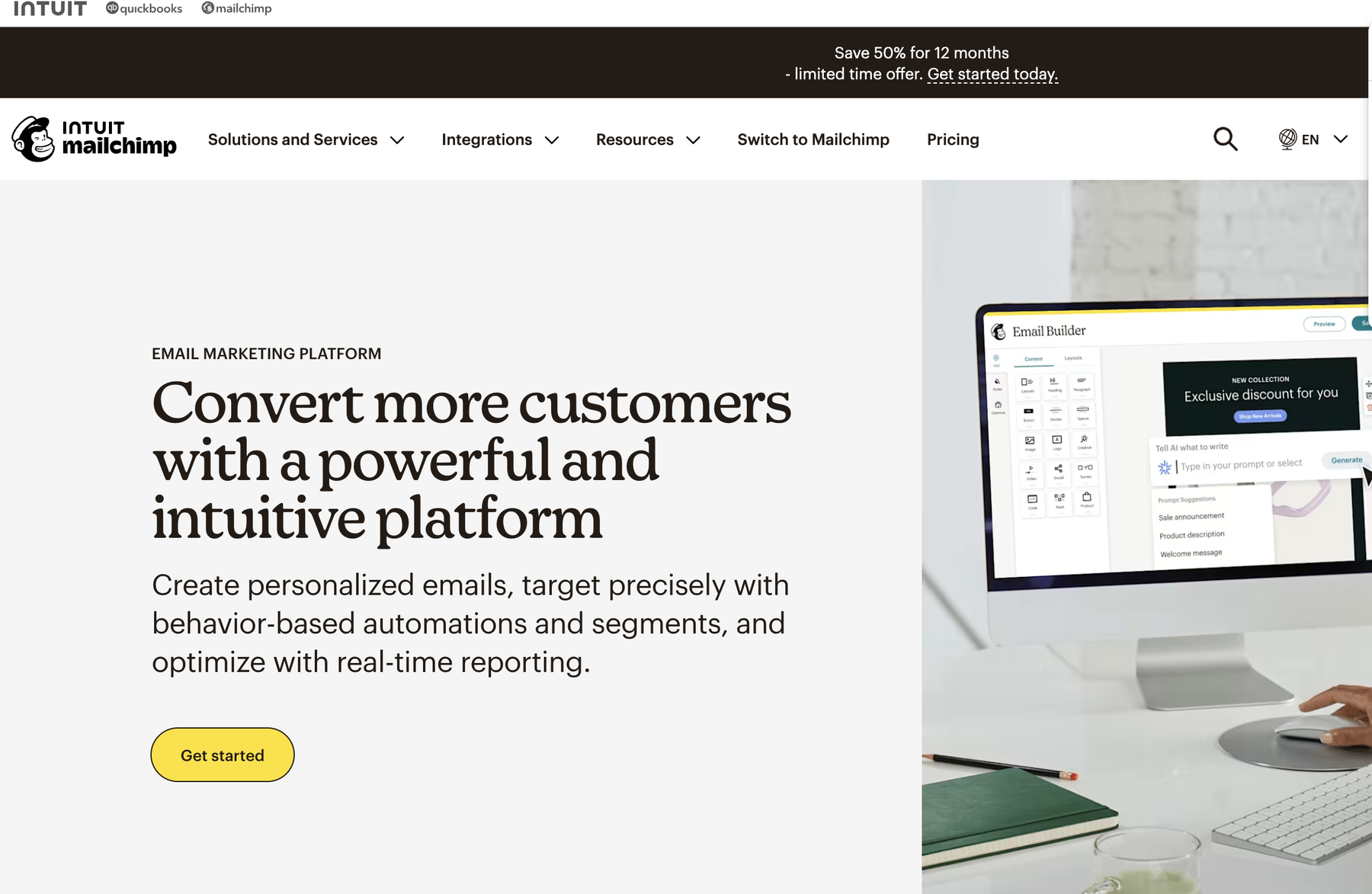
Overview: As perhaps the most recognizable name in email marketing, Mailchimp has evolved into a comprehensive marketing platform with tools that extend well beyond email.
Key Features:
- Sophisticated marketing automation
- Advanced audience management and segmentation
- Integrated content studio for creative assets
- Website and landing page builder
- Customer journey mapping
Pricing: Free plan available; Standard plans start at $13/month.
Best For: Growing businesses that need a comprehensive suite of marketing tools beyond just email.
Pros:
- Extensive ecosystem of third-party integrations
- Powerful analytics and reporting features
- Multi-channel marketing capabilities
- Strong deliverability reputation
Cons:
- Increasingly complex pricing structure
- Can become expensive as your subscriber list grows
- Sometimes overwhelming for email marketing beginners
4. ActiveCampaign—Best for Advanced Automation
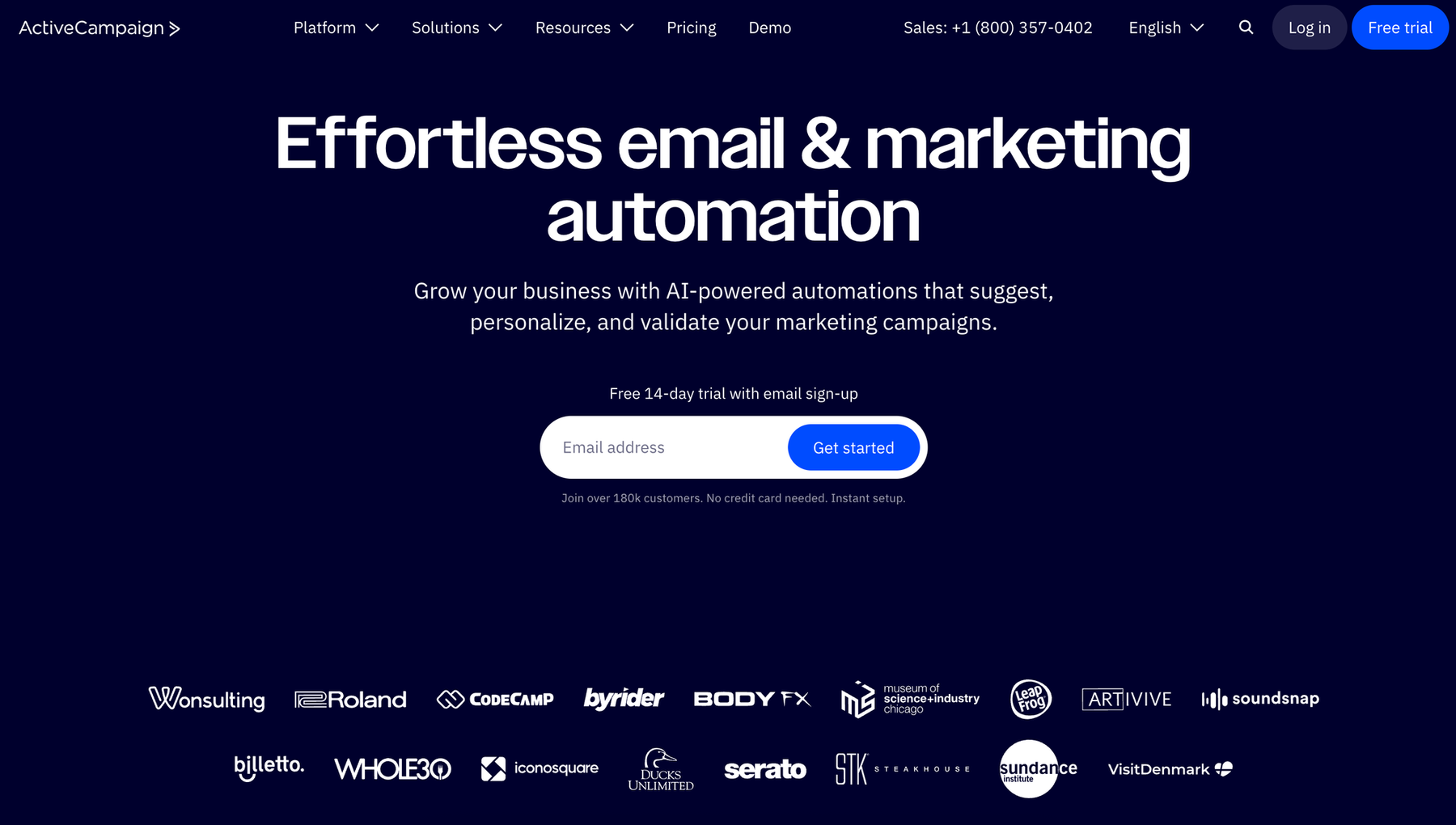
Overview: ActiveCampaign excels at sophisticated marketing automation combined with CRM functionality, making it ideal for businesses with complex customer journeys.
Key Features:
- Industry-leading automation capabilities
- Integrated CRM with sales automation
- Customer experience automation
- Predictive sending for optimal engagement
- Split testing and optimization tools
Pricing: Starts at $9/month for the Lite plan.
Best For: Businesses requiring sophisticated marketing automation and seamless CRM integration.
Pros:
- Powerful, flexible automation capabilities
- Excellent deliverability rates
- Strong segmentation and targeting options
- Machine learning features that improve campaign performance
Cons:
- Steeper learning curve than simpler platforms
- Higher pricing for access to advanced features
- Can feel overwhelming for basic email marketing needs
5. Constant Contact—Best for Event Marketing
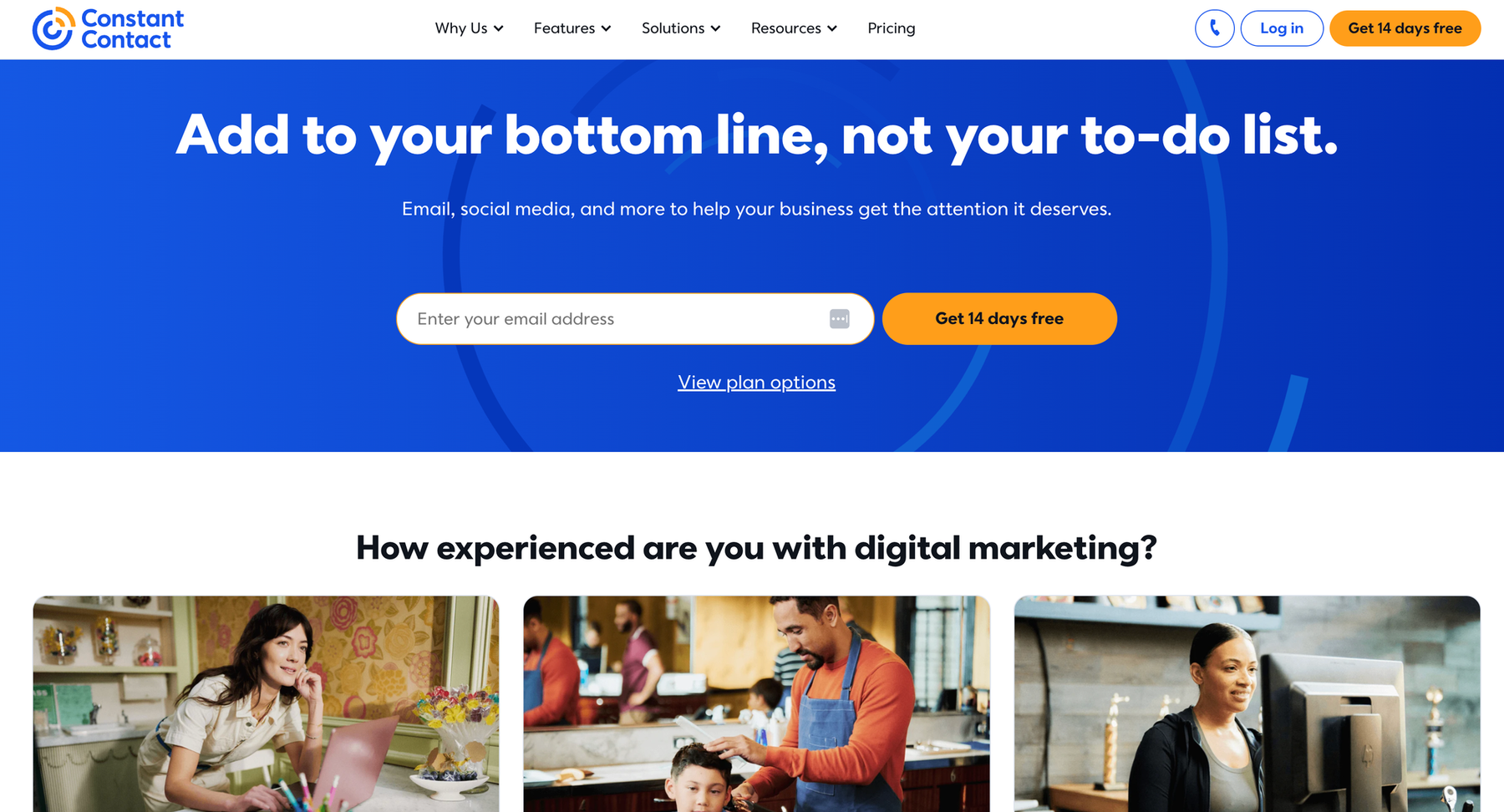
Overview: Constant Contact offers a user-friendly email marketing solution with particularly strong event management capabilities, making it ideal for businesses that regularly host events.
Key Features:
- Diverse email templates for various industries
- Integrated event management tools
- Social media posting capabilities
- List building and growth tools
- Survey and polling functionality
Pricing: Starts around $9.99/month for the basic email plan.
Best For: Small businesses and non-profits, particularly those that incorporate events into their marketing strategy.
Pros:
- Responsive, US-based customer support
- User-friendly interface requiring minimal learning curve
- Specialized event marketing features
- Solid deliverability rates
Cons:
- Limited automation capabilities compared to specialized platforms
- Fewer advanced features than newer competitors
- Less competitive pricing for advanced functionality
6. Kit (formerly ConvertKit)—Best for Content Creators
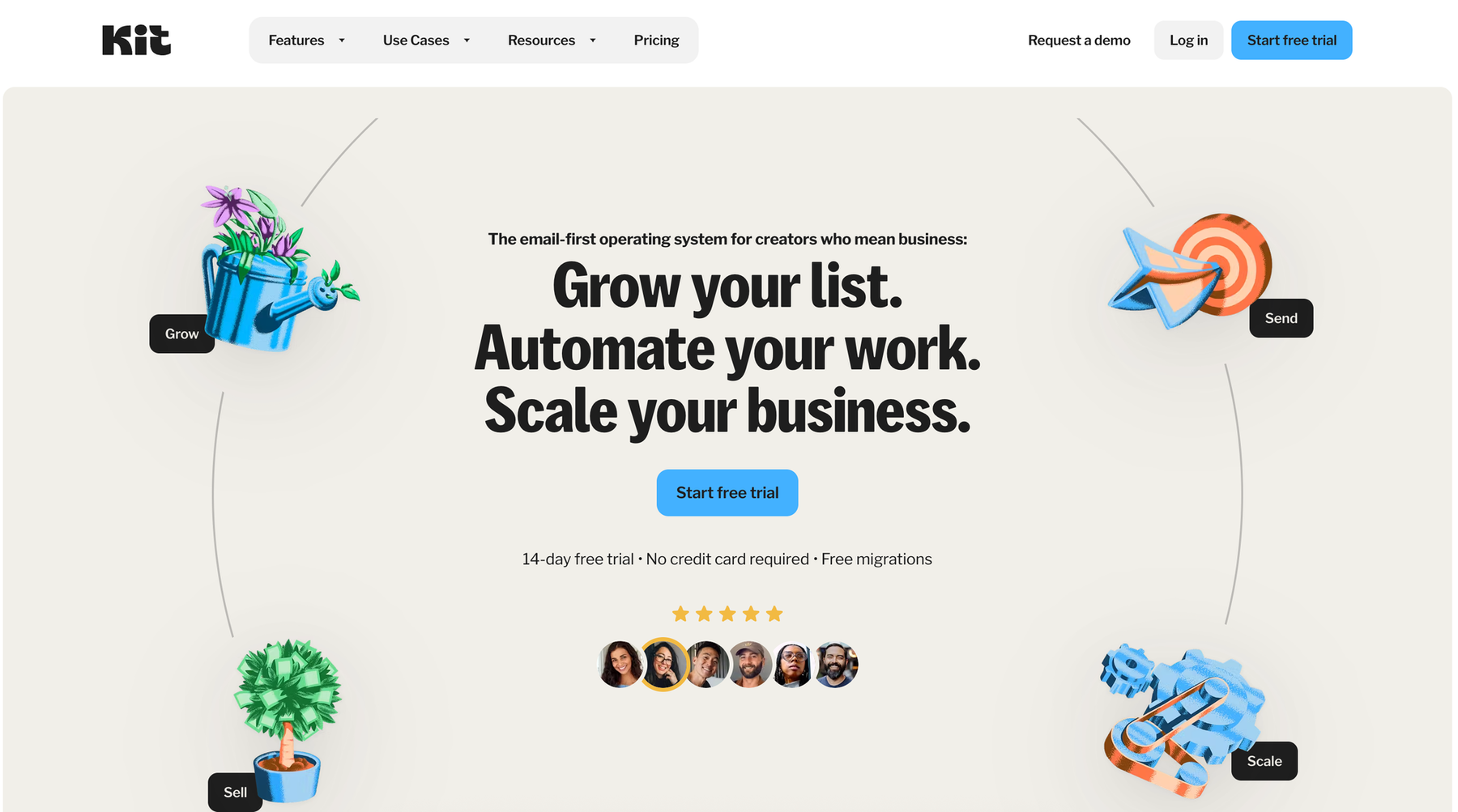
Overview: Kit has built its platform specifically for content creators, bloggers, and digital product sellers, with features designed for audience building and monetization.
Key Features:
- Visual automation builder specifically for creator workflows
- Clean, conversion-focused landing pages
- Integrated digital product sales tools
- Sophisticated subscriber tagging system
- Creator-focused email templates
Pricing: Free plan up to 1,000 subscribers with limited features; paid plans from $29/month.
Best For: Content creators, bloggers, podcasters, and digital product sellers.
Pros:
- Simple, text-focused design optimized for engagement
- Robust tagging and segmentation system
- Excellent deliverability performance
- Purpose-built for digital creators and their specific workflows
Cons:
- Limited design flexibility compared to general-purpose platforms
- Higher price point for smaller subscriber lists
- Less suitable for businesses outside the creator economy
7. GetResponse – Best for Webinar Marketing
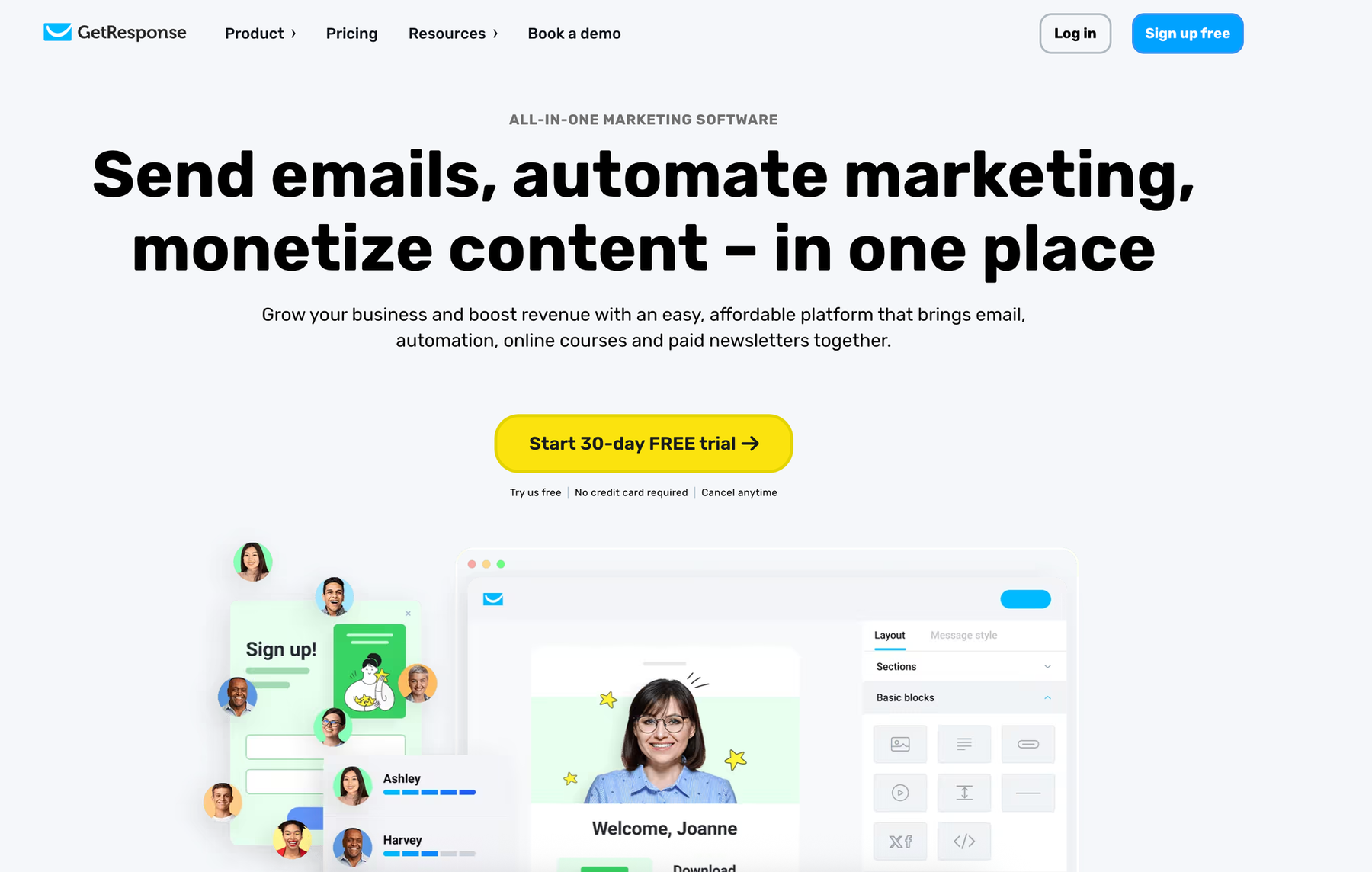
Overview: GetResponse stands out by combining email marketing, landing pages, and webinar functionality in one integrated platform – perfect for businesses that incorporate webinars into their marketing strategy.
Key Features:
- Built-in webinar hosting capabilities
- Sophisticated autoresponder sequences
- Landing page creator with A/B testing
- Conversion funnel builder
- E-commerce marketing tools
Pricing: Plans start at $15/month.
Best For: Businesses that incorporate webinars as a key component of their marketing strategy.
Pros:
- Comprehensive feature set covering multiple marketing channels
- Integrated webinar functionality saves on separate software costs
- Good value for the breadth of features offered
- Strong autoresponder capabilities
Cons:
- Interface can be challenging to navigate for beginners
- Some advanced features only available in higher-tier plans
- Webinar functionality more basic than dedicated webinar platforms
8. Sender—Best for Budget-Conscious Features
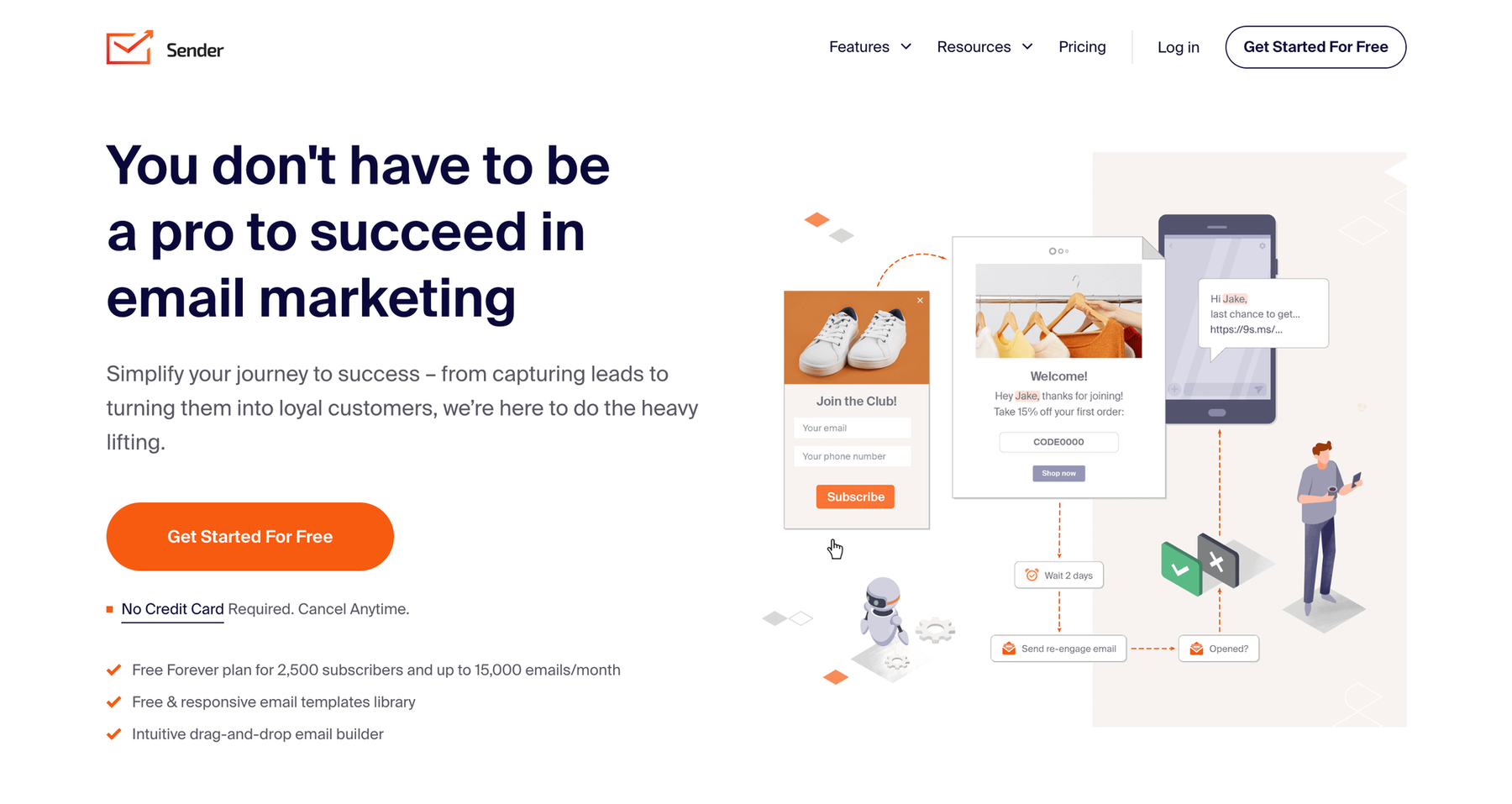
Overview: Sender delivers surprisingly advanced features at budget-friendly price points, making sophisticated email marketing accessible to businesses with limited resources.
Key Features:
- Comprehensive email automation workflows
- Integrated SMS marketing capabilities
- Customizable, mobile-responsive templates
- Advanced analytics and reporting
- A/B testing and optimization tools
Pricing: Free plan for up to 2,500 subscribers; paid plans from $8/month.
Best For: Cost-conscious marketers seeking advanced features without premium pricing.
Pros:
- Exceptionally generous free plan
- Advanced automation features typically found in premium platforms
- Good deliverability rates
- Excellent value proposition for feature set
Cons:
- Less established than legacy platforms
- Fewer integration options than more mature competitors
- Limited template variety compared to design-focused platforms
9. Moosend—Best for E-commerce Automation
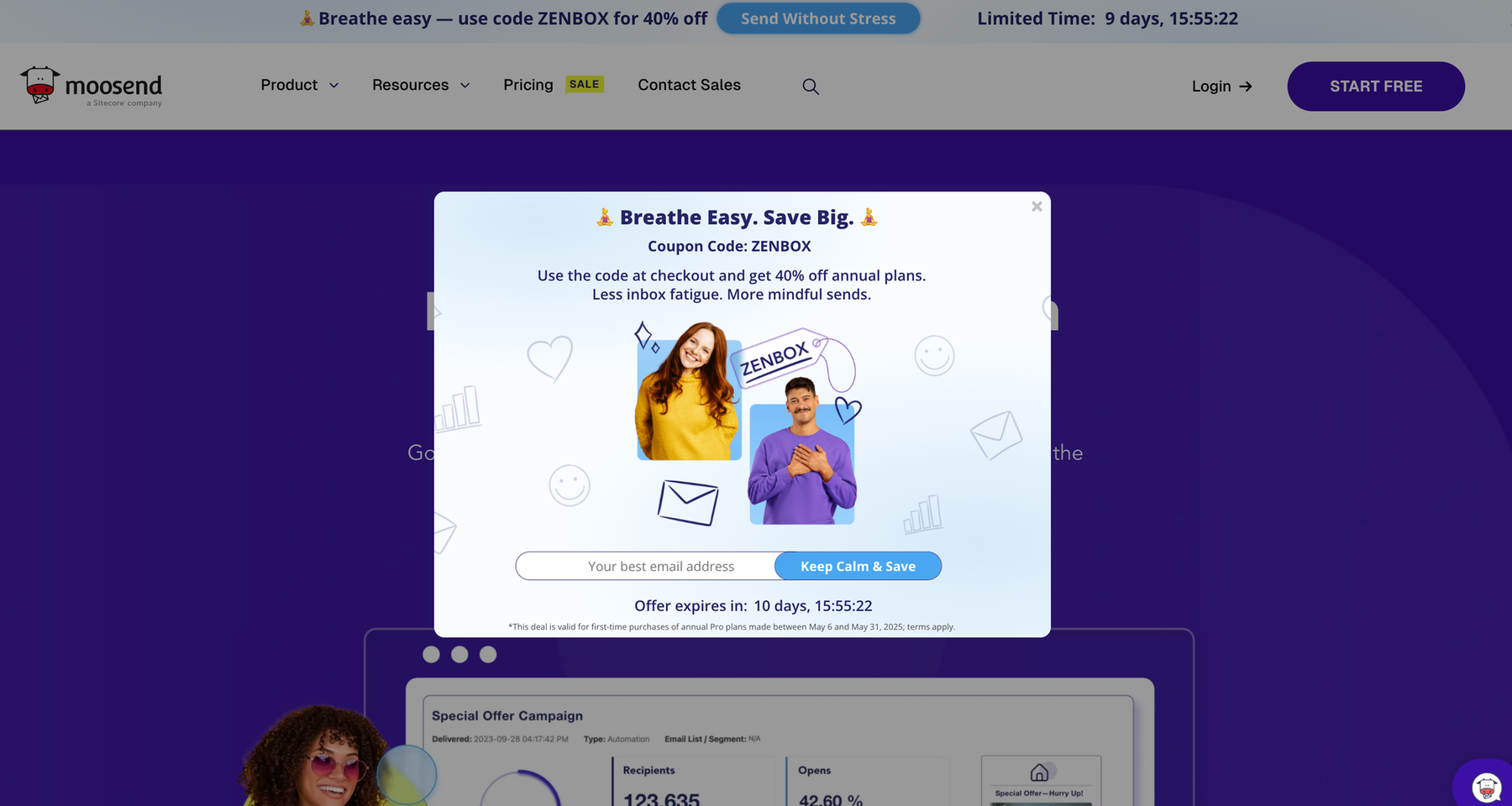
Overview: Moosend combines user-friendly marketing automation with powerful segmentation and e-commerce-specific features designed to boost online retail performance.
Key Features:
- Intuitive email automation workflows
- Advanced customer segmentation capabilities
- E-commerce-focused landing pages
- AI-powered product recommendations
- Weather-based campaign targeting
Pricing: Plans start at $9/month with no free plan.
Best For: E-commerce businesses and marketers seeking powerful automation without complexity.
Pros:
- Intuitive, user-friendly interface requiring minimal training
- Sophisticated automation capabilities that remain easy to use
- Strong e-commerce-specific features like abandoned cart recovery
- AI-powered recommendations for personalization
Cons:
- No free plan available
- Limited integration options compared to more established competitors
- Less suitable for complex B2B marketing needs
10. Brevo (formerly Sendinblue)—Best for Multi-Channel Marketing
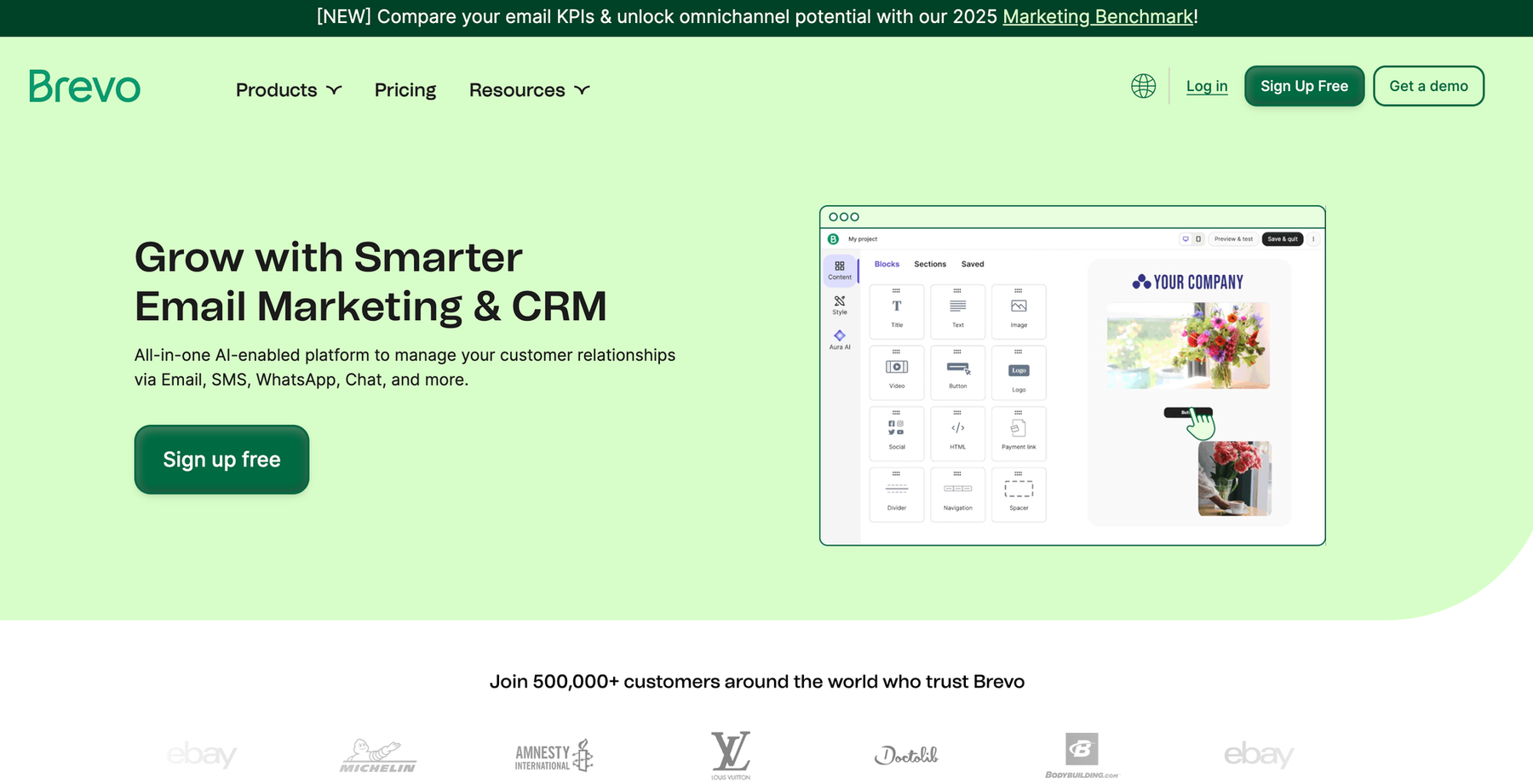
Overview: Brevo delivers a comprehensive marketing platform that combines email, SMS, and chat capabilities in one integrated solution.
Key Features:
- Combined transactional and marketing email functionality
- Integrated SMS marketing capabilities
- Live chat and conversational marketing tools
- Landing page and form builder
- CRM functionality for contact management
Pricing: Free plan available; paid plans start at $25/month.
Best For: Businesses wanting to coordinate email, SMS, and chat marketing from a single platform.
Pros:
- Comprehensive multi-channel marketing capabilities
- Includes SMS marketing in most plans
- Strong deliverability performance
- Powerful API for custom integrations
Cons:
- Limited automation features in free and entry-level plans
- Email builder less intuitive than some competitors
- Higher learning curve for utilizing all available features
How to Choose the Right AWeber Alternative
Finding the perfect AWeber replacement isn't just about features or price—it's about finding the right fit for your specific business needs and future growth plans. Here's how to make the best choice:
1. Assess Your Business Needs
Start by taking inventory of what matters most to your business:
- List size and growth projections: Some platforms become significantly pricier as you grow, while others offer more scalable pricing models.
- Required features: Prioritize must-have capabilities like automation, landing pages, or A/B testing.
- Integration requirements: Ensure compatibility with your existing tech stack, CRM, e-commerce platform, or other essential tools.
- Budget constraints: Consider not just current pricing but how costs will scale as your subscriber base grows.
2. Consider Your Technical Expertise
Be honest about your team's technical capabilities:
- User interface complexity: Some platforms offer simplicity at the expense of advanced features, while others provide power with a steeper learning curve.
- Available support options: Consider whether you need phone support or live chat or can manage with email or knowledge base resources.
- Implementation requirements: Evaluate what's involved in migrating and setting up your new platform.
- Learning curve: Factor in training time for team members who will use the system regularly.
3. Evaluate Growth Potential
Your chosen platform should grow with your business:
- Scalability of pricing plans: How do costs increase as your subscriber list grows?
- Advanced features for future needs: Even if you don't need sophisticated automation today, will you want it in a year?
- API access and customization options: As your marketing becomes more sophisticated, you may need deeper customization capabilities.
- Enterprise-level capabilities: If rapid growth is expected, ensure your platform can handle enterprise-level demands.
Wrap Up
While AWeber has served many businesses well over the years, today's email marketing landscape offers more specialized, feature-rich, and often more affordable alternatives tailored to specific business needs.
For budget-conscious businesses seeking personal support and reliable delivery, Maileroo offers exceptional value. Content creators and course sellers will find Kit's purpose-built features ideal for their workflows. E-commerce businesses might benefit most from Moosend's specialized features, while companies needing sophisticated automation should consider ActiveCampaign.
The perfect AWeber alternative balances your current requirements, technical capabilities, budget constraints, and future growth plans. We strongly recommend taking advantage of free trials to thoroughly test your top choices before making a final decision.
By selecting the right platform for your specific needs, you can often reduce costs while gaining access to more advanced features, better support, and improved deliverability—all contributing to more successful email marketing campaigns and stronger customer relationships.


